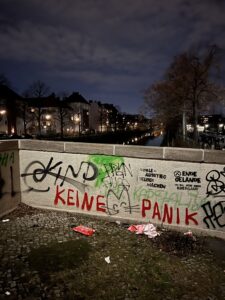Ever since I was a little girl, I wondered about the meaning of “home” – Zuhause. I left the first place that earned that name – my parents’ house – when I was 18, to volunteer in Latin America. After that, I have called an island, a student city, a European city, a Californian City, and the German capital my home. And there was always another ”home” at the same time: that of my parents, that of my partner, the one I had just left. When I was away, I also spoke of home – Heimat – this region with its cultural peculiarities that had shaped me, my value system and my cycling heart. A confusion arose that was to last until the start of my master thesis: Where am I really at home, zuhause? To answer this question, I needed an idea of what home actually is. I went on a search: in conversations with friends, interviews with strangers, in creative work – and with my master thesis in 2012, also in researching the topic.
Resistance as a belonging crisis?
While writing my Ph.D. on freedom-based resistance dynamics and learning about what motivates people emotionally to engage in behavior to restate their freedom, my old question took on a new angle: do people seek connection in resistance, do they share their conflicting worldviews because they perceive a lack of belonging in the ‚outer world‘ they are in? Is this maybe a blind spot that comes with the challenging reality of living in the age of *wicked problems – where solutions are ambiguous, intertwined with moral, political, and professional complexities, which defy resolutions through conventional methods (Rittel & Weber, 1973)? Does this reality put all of us in a constant movement to find impossible solutions, and when we finally give up, we either stop to care or start to resist?
These questions threw me back into my research of home (Zuhause) and Heimat (primary home), where I found that both are terms of phases that need distance as well as presence in a system to become concepts for the individual.
New questions, first steps.
So, now I am going back on the journey to dig deeper into the concepts of home and belonging to map the field that spans between optimal distinctiveness (being unique and part of the community at the same time; Brewer, 1991), the disrupted walls between the social front- and backstage (Goffman, 2003), and the personal experiences for what it means to belong.
I will start by talking to people again. I will launch a podcast to capture perspectives on belonging. I will use the conversations scientifically to distill versions of belonging. I will engage in the research community and learn about existing concepts of belonging. I will then discuss my questions, seek collaborations, and outline a research agenda.
We can learn to belong.
Finally, I am convinced that we can learn to belong. I want to bring my findings into action by creating workshops, coaching approaches, and applications for areas that can serve as an oasis of belonging—such as language learning contexts or community building in universities.
If you feel drawn to any of these ideas, please reach out to me. I can’t wait to meet you.
Image by ideogram.org


